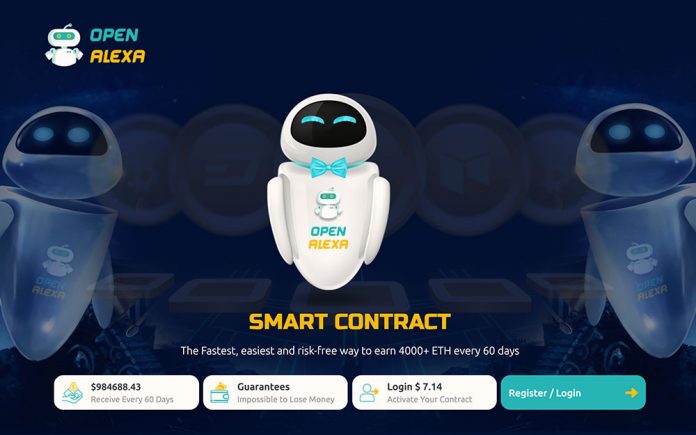In its most basic sense, OpenAlexa can be thought of as a smart contract application that is designed to run atop the Ethereum network. However, a closer look at the offering shows us that OpenAlexa’s native application code has been designed to “distribute incoming transfers among participants” in a way that is in accordance with the project’s algorithmic structure. It seems the cat is out of the bag when it comes to these Ethereum blockchain smart contract business models as now OpenAlexa joins the likes of Forsage and XOXO Network to name a few.
From a more technical standpoint, it is worth mentioning that OpenAlexa is an open-ended platform and thus has no single administrator. And while there is a creator who uploaded the contract code to the Ethereum blockchain, following its deployment, the smart contract has been running independently. In this regard, no single person, entity, or organization has the right to alter the workings of this smart contract by attempting to make unauthorized changes to it.
A Closer Look at the Project
Upon examining the project in more detail, we found that the OpenAlexa website has not provided any information as to who is behind the project (both in terms of its operational governance or ownership). Additionally, a quick Who.is search revealed to us that the OpenAlexa website domain (“openalexa.io”) was registered recently on the 30th of March, 2020 by an unknown entity.
Furthermore, an investigation into where OpenAlexa’s online hits come from, we found that a little over 92% of the platform’s traffic comes from India — which seems to suggest that the company’s operations might be based out of the country itself. These details coupled with the fact that there is no information available about the project’s core operational staff seems to suggest that the entire setup might be a quick cash grab scheme.
Lastly, in order to register for the service, users are required to pay a certain amount of money that has been outlined on the official website. Any profits that may be incurred are sent directly into one’s given wallet address (after deducting the admin fees). In this regard, the total admin charges come up to around 10% of the operation fee and 6% OAP Token development fee.
Other Details Worth Pointing Out
At the time of writing this review, it appears as though OpenAlexa has no retailable products or services on offer. The only thing subscribers/affiliates can present to other potential clients is the affiliate membership itself.
From a compensation standpoint, OpenAlexa makes use of a pure MLM-based pyramid structure wherein new any ETH tokens that are acquired from new recruits ( 0.03 ETH) are passed on to existing affiliates who lay above them in the overall hierarchy. Technically speaking, payment accounting is done using a 2×6 matrix structure, such that there is an affiliate at the top of the matrix, with two positions laying directly under them.
Furthermore, each of these two sub-affiliates themselves have two more people under them. This structure continues to go on for six levels, thus representing a pyramid that, in the end, is bound to collapse once the ETH inflow starts to reduce.
The Structure
From the Standpoint of the First Matrix
Level 1: Every submission of 0.03 ETH qualifies an individual to receive 0.03 ETH from two affiliates that are placed directly below them.
Level 2: Every submission of 0.05 ETH qualifies an individual to receive 0.05 ETH from two affiliates that are placed directly below them.
Level 3: Every submission of 0.1 ETH qualifies an individual to receive 0.1 ETH from two affiliates that are placed directly below them.
Level 4: Every submission of 0.5 ETH qualifies an individual to receive 0.5 ETH from two affiliates that are placed directly below them.
Level 5: Every submission of 1 ETH qualifies an individual to receive 1 ETH from two affiliates that are placed directly below them.
Level 6: Every submission of 3 ETH qualifies an individual to receive 3 ETH from two affiliates that are placed directly below them.
The exact same structure is applicable within the second matrix as well. However, the ETH amounts involved are as follows: 7,12,15,25,30,39.
Last but not least, it is worth bearing in mind that OpenAlexa doles out payments via a sixty-day recurring subscription scheme.
How to Signup? Is OpenAlexa really worth your time?
As mentioned in an earlier section, OpenAlexa affiliate memberships require subscribers to invest a minimum sum of 0.03 ETH. Not only that, full participation will eventually end up costing users a total of around 132 ETH.
With that out there, it is quite obvious that this matrix-based MLM scheme is a ploy that is destined to eventually implode — especially after the top tiers of the pyramid have all filled up. In our estimation, it would be best if investors stay away from this offering as it could end up costing them their hard-earned savings.










